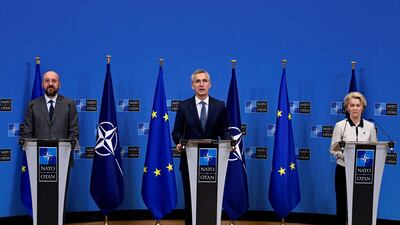European Commission President Ursula von der Leyen on Tuesday said Ukraine should get all the necessary military equipment it needed.
Her comment came as the EU and Nato reaffirmed their co-operation and western countries consider sending heavy tanks to help the nation fight against a Russian invasion.
“Ukraine should get all the necessary military equipment they need and can handle to defend their homeland,” said Ms von der Leyen.
She was alongside EU Council President Charles Michel and Nato Secretary General Jens Stoltenberg at the alliance’s Brussels headquarters after they signed a joint declaration.
Ms von der Leyen said that Kyiv should receive advanced air defence systems “but also other types of advanced military equipment, as long as it is necessary to defend Ukraine”.
Mr Stoltenberg welcomed recent announcements by the US, Germany and France that they would provide new types of “armoured vehicles, infantry fighting vehicles and other types of armour to Ukraine”.
“This is important,” he said.
Ukraine has for months asked western countries to increase military support by sending tanks.
Countries such as Germany say they fear further angering Russia and escalating the war.
But several recent announcements have signalled the West may be changing its mind, with France saying last week that it would send light tanks, or AMX-10 RC armoured fighting vehicles.
The move sparked a debate on the exact definition of a tank, with most experts saying the AMX-10 RC is designed for reconnaissance missions, not heavy fighting.
Shortly afterwards, Germany announced it would send Marder infantry fighting vehicles and the US said it would send its Bradley model.
But with fears of a renewed Russian offensive looming, pressure is already building on countries to send more powerful tanks.
There are reports that the UK is considering sending its Challenger 2 main battle tank, increasing pressure on Berlin to send its Leopard 2 tank.
Further announcements may be made next week when the US-led defence contact group to support Ukraine, which includes Nato allies, will meet.
Mr Stoltenberg said that security officials would discuss what types of weapons were needed with Ukraine’s Defence Minister.
“We should not underestimate Russia,” said Mr Stoltenberg.
“They are mobilising more troops, working hard to acquire more equipment and ammunition and showing willingness to suffer to continue the war.”
Mr Stoltenberg also said he was confident that Finland and Sweden's bid to join Nato would soon be finalised.
The two Nordic countries applied to join the alliance following Russia's invasion of Ukraine last year. Their application has been ratified by all of Nato's 30 members except Turkey and Hungary.
Turkey has reportedly made several requests from Sweden, including that it takes a harsher stance against the Kurdish diaspora.
Mr Stoltenberg recognised that “Turkey has legitimate security concerns”.
Swedish Prime Minister Ulf Kristersson on Sunday said his country could not accept some of the requests.
Mr Stoltenberg said that Finland and Sweden were already being treated as Nato allies.
“Finland and Sweden are more and more integrated into Nato’s military structures so it’s inconceivable that Finland and Sweden will face any military threat without Nato reacting to that,” he said.
The EU-Nato joint declaration signed on Tuesday was the third since 2016.
It said that Russia’s invasion of Ukraine was the “gravest threat to Euro-Atlantic security in decades” and reaffirmed Nato’s role as the foundation for collective defence for its allies.
It also recognised the value of a “stronger and more capable” European defence.
Mr Michel said there was “no doubt” that European sovereignty in matters of defence was “more necessary than ever”.
The declaration also mentioned China’s “growing assertiveness” as presenting challenges needing to be addressed.
“The Russian threats and challenges are the most immediate but not the only ones,” said Ms von der Leyen.
“We also witnessed China increasingly attempting to reshape the international order to its benefit, so we must bolster our own resilience.”


